#author: we are the same
Text

This week Mia reads All I Know is I'm in Trouble ('cause the atmosphere's so cold) (AO3 | Fic Post) by @so-why-let-your-voice-be-tamed (we_are_the_same on AO3).
While on a holiday with his best mate Zayn, Louis meets Harry, who seems to dislike him from the start. It's just his luck he ends up getting stuck on a ski lift with Harry. Except maybe the universe knows better and he really is lucky.
Listen now on your favorite Podcast app: Anchor | Spotify | Google Podcasts | Apple Podcasts | or check out the Episode post on AO3 here. You can also download our episode on Google Drive here.
#s2e2#author: we are the same#harry/louis#zayn/liam#45-60 minutes#cabin#christmas#college/university#enemies to lovers#fluff#meet ugly#holiday#podfic#hlcreators#hlupdate#hlficlibrary#hljournal#1dficvillage#1dsource
53 notes
·
View notes
Text
Jason Todd is stealing the tires off of the Batmobile, when a man walks up on him doing it.
The man stares at him, nods, and just says "I'll keep a look out, man, go go go!"
So Jason does, and he gets all four tires with the man's help.
The man introduces himself as Danny Foley, and asks Jason if he wants to go get some burgers.
Danny, meanwhile, has decided that yes. This is the child he will adopt. He just has to convince the kid of that.
Batman has to call in Alfred to bring around his backup vehicle with spare tires, and little Timmy gets some wonderful shots of Batman having to replace his own tires.
@simplestoryteller
#dpxdc#dcxdp#dp x dc#dc x dp#story prompt#phanfic#i prefer the eternal trio#sam and tucker are already waiting at Batburger when Danny comes in with a tiny Jason#they take it in stride#all adult minds went to the same result#“we must adopt this chaos child”#the conversation goes like#“stole the tires off the batmobile you say? nice.”#“are u sure that you'll get the proper price amount for them? do you want me to come along to make sure you do?”#“I can teach you how to evade authorities really well. Like REALLY well. wanna learn?”#Also fuckin batman finding out about tim way sooner#because he heard tim giggling#but he decided to let it slide cuz that's just a kid having some fun#he can always get more tires
2K notes
·
View notes
Text
marauders fans: we separated the art from the artist, this fandom is completely separate from the source material;
also them, will degrade any writer who doesn't write a coffee shop au, or university au, or jegulus in the only acceptable grumpyboyxsunshineboy trope, bullying artists for drawing sirius with body hair, bullying writers for not writing your exact headcanons, not allowing for people to grow their own opinions (aka. making ATYD the "intro-fic"), and not supporting artists and writers who are not the fandoms "it-person" for the week.
Bro at this point give it back to that ugly terf.
#i do not in anyway support support the author#the marauders fandom has become not a safe space for exploration and adaptation#we have to now all like the same tropes and have a conservative mindset when it comes to sex#ffs its a fandom#we should not be judged for ships or fics#this is not a joke#marauders era#sirius black#james potter#remus john lupin#peter pettigrew#wolfstar#regulus black#jegulus
728 notes
·
View notes
Text

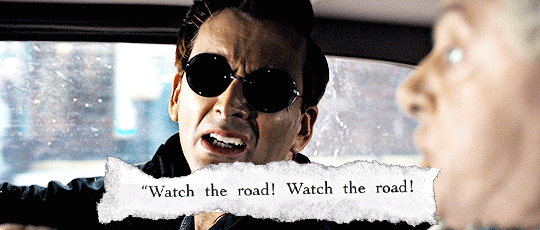


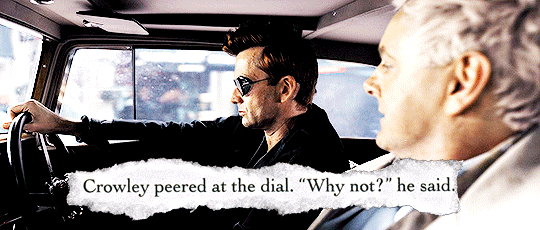
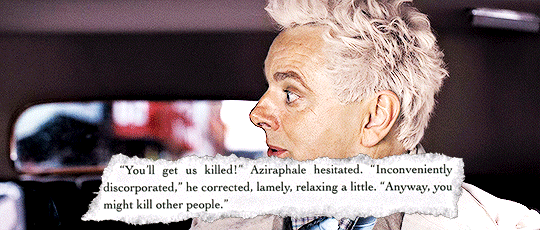

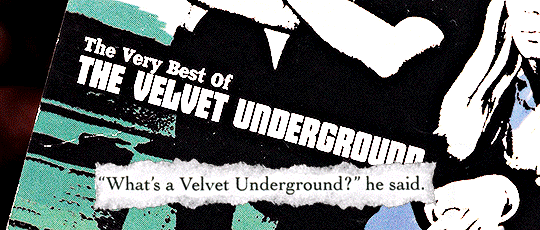
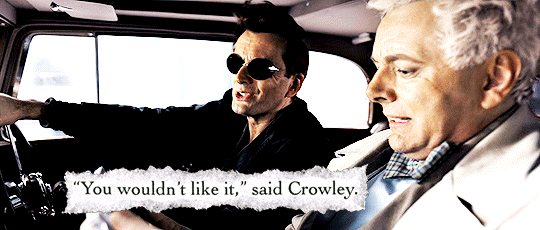
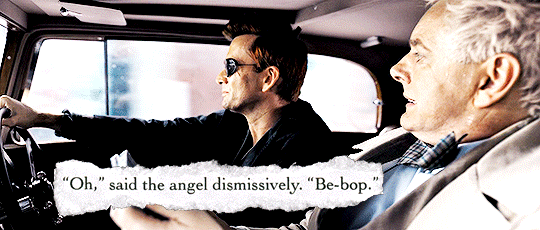
from page to screen - Good Omens
#I absolutely love how some scenes are word for word the exact same from book to show#guess thats what you get when you have the author writing the show. wish we had more adaptations like that#yes this took forever. my hands hurt#good omens#these are literal scans from my copy of the book btw#david tennant#michael sheen#neil gaiman#terry pratchett#good omens book#ineffable#ineffable husbands#aziraphale#ineffable idiots#goodomensedit#ineffable spouses#aziracrow#crowley#anthony j crowley#aziraphale and crowley#goodomens#nikkirookgif#gomensnaap
967 notes
·
View notes
Text
“Social media has made this generation so narcissistic and self centered everyone’s always posting selfies and posting about everything they do during the day” shut up. The human desire to show you exist and you were here is innate and we’ve been doing it since the days we were leaving hand prints on cave walls
#I’m in a romantic mood rn don’t mind my bullshit lol#I have a lot of feelings abt the idea of how we want to show we exist and be seen#it’s really a shame I don’t see this idea explored much in media#there is stuff about leaving behind a legacy in media sure but that’s not quite the same#bojack did do this which I rly liked#in the episode where he’s giving a speech at his moms funeral#talking about how she said ‘I see you’ before she died#the desire to just be seen#also this book I like called moral lessons had a chapter on this#it was a chapter about smoking and how part of the appeal of smoking is#you sort of prove you’re existence. the smoke and the smell of it goes beyond you and your presence is undeniable#and the same is for wearing perfume#‘’‘I am here’ she sniffs happily ‘I am really here’’’#I rly like this book lol#edit: it’s mortal lessons not moral lessons#my bad lol#also the author is Richard Selzer#if anyone’s interested in reading it
2K notes
·
View notes
Text
artists have "draw this in your style", i think fic authors should start doing "write this in your style" where a ton of people write the same prompt but all do their own lil interpretations and characterizations and fun dialogue bits etc
#also then we get to read our favourite scenarios more 😈#i know a big worry among authors is “what if this is too close to something that's been done before” and “is this tired/cliche”#but artists draw from the same references all the time! and it's amazing all the time#even with the exact same prompt#even if people used the same overall beats for the beginning/middle/end#it's always going to be different. we all view and create art in unique ways.#and there are always going to be new variations and ideas and interpretations that make it special.#also again. ik this has been said. but there are so many tropes i would read one million variations of.#need to see all my favourites in Situations™️#clear posts#on writing#writing#ao3#fanfiction
778 notes
·
View notes
Note
Any other LGBTQ+ Headcannons that are canon is the comic??;)
*patiently awaits Cupioromantic Donnie*
hmm... had to think about this for a while and talk about it with co-author, but here's what we got. we mostly base this stuff on how plausible it is in show/if there's evidence for it. with a dash of personal experience. This only applies to residuum, btw. I have different personal headcanons for these characters outside the comic.
april: lesbian. this is mostly based off of the fact that most aprils get with their caseys & the comment she said to dale. which could be taken as disinterest in dale specifically, but she seemed more concerned with impressing that popular girl earlier and that reads as more... saphic, i suppose. or at the very least homoromantic.

raph: raph is just raph. we look at him and basically just *tv static*. go crazy. all we got is jokes or stuff that has too little evidence to support. so, yeah, he's whatever you want him to be i guess?
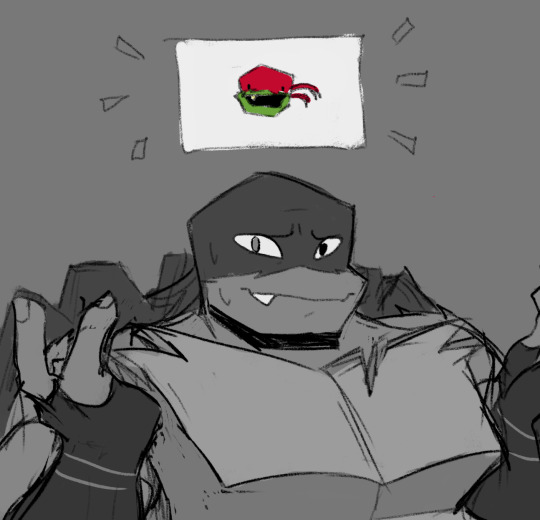
leo: trans. already said my reason in the other post. also, gay. if gay were a power source he could power the entirety of the united states for five months straight without a single power outage. failing power grid notwithstanding (< thats the actual word. its supposed to be mushed together like that. wack.).
donnie: as much as i'd like him to be ace/aro spectrum rep, he just doesn't have the evidence in show for us to apply it to him in this comic. it's funny, for being hc as ace so often he sure is the most outwardly romantic/sexual turtle in the show lmao. one! cherry: "you're so cute, but you're so mean! why do i always go for your type?" two! astrogirl?? (whatever her name is) he is very very romantic with her. he has a type y'all. also just look at those two, he's a leg man lmao (bootyyshaker9000 anyone? ha!) anyway. and with the bromance/instant chemistry he had with that one guy in the purple dragons... Pan. or possibly Omni as he does seem to favor... cute brutal femme... Yeah. Omnisexual.
(you have no idea how fucking bad i want this boy to be ace spectrum. hes got the colors y'all!! The Colors!!!!! but alas... i am bound by my canon plausibility creed for this comic)
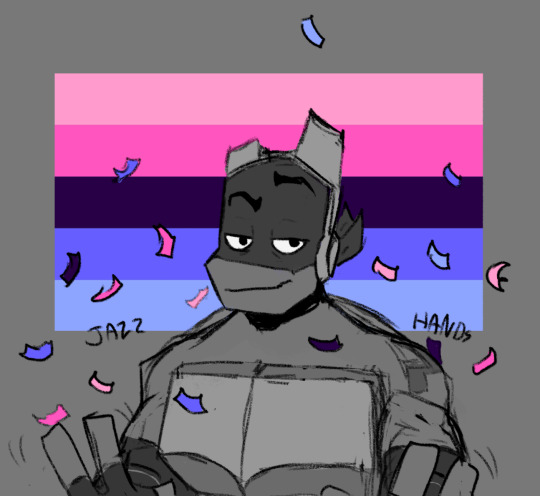
mikey: ace. possibly ace/aro. he shows interest in literally no-one. we're aware that the common hc is pan but... we know a pan 13 year old, and let me tell you ahahahaha, kids going through puberty are very uncomfortable to be around sometimes, especially around their partners. or crushes. and mikey... well, that boy is ace behavior personified lmao. aces in the back you get what we mean right?? right??? anyway commiting to aroace
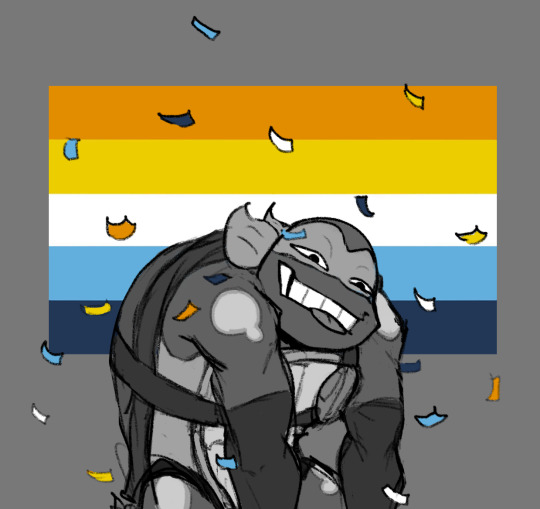
#residual asks#rottmnt#i really get a kick out of he/him butch lesbian raph and ghostbear-sexual raph#but i'd never use those seriously. or at least in this comic#co-author says what they get if they really had to choose for raph is ace homoromantic#but otherwise...#he's just raph#like we can't apply any identity to him. and we really mean ANY identity. not even straight or umbrella terms like queer#its a very odd feeling#i also really like trans april but we don't have enough evidence for it#in fact there's actually counter evidence- but don't let that stop your dreams y'all. it just stops ours :P#sorry for stepping on your donnie dreams anon#but honestly i think that label applies more to 2012 donnie imo#i really do personally prefer ace/aro donnie. but i'd make everyone ace if i were able lmao#co-author would also do the same thing ahaah#i just don't like depicting romantic relationships. or attraction ahahaah#with mikey... we get why people hc him as pan... but like its a fandomism stereotype#that literally every fandom applies to optimistic friendly characters. and honestly i really don't like the fandomism stereotypes#i just find them... unenjoyable i guess#cuz like y'alll... your sexuality isn't inherently determined by your personality or vise versa#cuz like i know for sure that in fandom spaces- if i were a character- i'd be stereotyped as pan or a hypersexual cis het#to which i am neither. at all.#and co-author would be stereotyped as the demure femme book lesbian#which they are VERY much not#and i know this because i've been fandomified by people in my life more than once#it is a very uncomfortable experience y'all#whoops rant in the tags#residuum#rottmnt residuum#residuum wb
469 notes
·
View notes
Text
Y'all. Probably the most UNIVERSALLY ACCEPTED criticism against grrm is the abundance of gratuitous extreme sexual violence against women in asoiaf. GoT doubled down on that and is endlessly criticized for that. On the ONE (1) INSTANCE where sexual violence was NOT part of a female character's arc in grrm's work, HotD decided to introduce it as a means of giving "nuance" to a story and making a character more sympathetic. And now not only is this not considered a sexist narrative but on top of that you call this an inspired twist ffs I'm gonna eat my hair
#like there is no way to be so unserious guys#just decide#i can't believe we have been trashing GoT for centuries now for the exact same thing we are appreciating in HotD right now#'HotD is different' really? Where?#because of the lesbian drama? WOW#Is it based on shock value? yeah#does it have gratuitous violence? yeah#does it have MORE gratuitous violence than the author? YEAH#does it use rape as a means of sympathizing with a character like in Show!Sansa's case#which was THEN considered Oh So Problematic for some reason?#YEAH#asoiaf#fire and blood#anti hotd#aspa rambles#forever mad
98 notes
·
View notes
Text
Thinking about the Chevalier interlude, specifically the inaugural team of Wards. Like in universe, they sell it to this first group of kids (and presumably the rest of the world) as a place for second chances, to find friends and mentors who understand what youre going through, where you can learn to use your powers safely while making good memories. The kids broadly seem to believe in these noble intentions of course, but what really gets me is that I've seen readers buy into it!
"Oh, it's such a tragedy that the Wards program became this awful thing that traumatizes kids even more, and expects them to die for the sake of civilians! It's fallen so short of what it was originally supposed to be!"
No it has not??? The fact that the triumvirate and Hero are saying it has this noble goal doesn't make it true. The Wards was pretty clearly always a way to increase the amount of bodies the prt could throw at threats, and we know this because it was started by the fucking Triumvirate as a part of the Protectorate! Alexandria literally came up with the idea of the Protectorate to legitimize the power of capes, and have a consistent source of heroes Cauldron could throw at problems. That is the whole reason for the PRT/Protectorate existing. So when we have this group of children brought in a subsidiary, there are 2 real options.
1). Cauldron and Alexandria decided they would be really niceys and created this program with no intentions other than helping these kids out.
Or 2). As things got worse, they realized the Protectorate didn't have enough manpower to do what they needed, and so they expanded it to include children (the demographic most prone to triggering). That way, they greatly increase the number of capes who they can send to fight and die as needed, and the ones who do survive their tenure in the Wards will be better trained when it comes time to join the actual Protectorate.
At the risk of sounding conceited, I think the second one is far more likely based on everything we know about Cauldron. Maybe it was originally a little nobler, and the goal was just to create more well trained heroes and cut back on young villains, but there's no way Alexandria, Doc Mom, and Contessa didn't factor in the ability to sacrifice the kid heroes if it improved their chances of success. That was absolutely a perk at minimum.
That's the real tragedy of the inaugural Wards. The kids were lured in with promises of safety, comraderie, and second chances like lambs to the slaughter. All the while, Alexandria and Cauldron knew that many (if not most) of these children would suffer abuse by the prt (like in the case of Reed), die, or face a fate worse than death like poor Mouse Protector. It's horrifying! The idea that they didn't know the danger these kids would be in is literally inconceivable. Especially when one of you is also the head of the prt! They knew, and they didn't care. It improved their chances at the end of the world, and so they did it no matter the cost.
#the same ppl will talk about Taylor being an unreliable narrator who we cannot trust#and then take Alexandria at face value#i think a lot of it is that this genre of guys very uncritically support and assume the best of authority figures#especially law enforcement#in a way that they just dont when it's a teenage girl who's never so much as glanced in the direction of a healthy coping mechanism#the great irony here being that fundamentally the prt/protectorate and Cauldron are all *also* being run by traumatized young women#and also that pretty much every negative opinion Taylor expresses abt the prt is 100% vindicated as the story goes on#genuinely baffled ppl can read Worm and be like 'Taylor's distrust of the prt was irrational'#it's the same energy as calling a woman hysterical#yes this *is* just me remembering the We've Got Worm podcast guys#they are my mortal enemies when it comes to wormposting#worm spoilers#worm#worm web serial#worm wildbow#parahumans
212 notes
·
View notes
Text

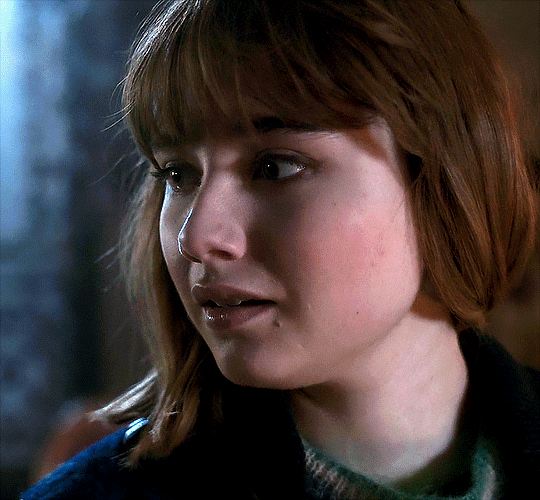

LOCKWOOD & CO. 1.03

#lockwood & co#lockwood and co#lockwoodandcoedit#anthony lockwood#anthonylockwoodedit#lucy carlyle#lucycarlyleedit#locklyle#locklyleedit#smallscreensource#tvedit#cinematv#userbeccaa#pearlcaddyedit#pearlcaddy l&co#this look gets to me#this wee moment of 'whoops our souls are made of the same stuff (recklessness in defense of what we love)'#his inhale and brow twitch are so much#the boy would really like to kiss her#'it's going to be a problem how hot i find your flagrant disregard for basic safety and my authority'#and on a non-locklyle note i love her wee smile in gif one#she got revenge for her problematic girlboss annabel ward and saved her family
476 notes
·
View notes
Text
reader: oh hey! the chain’s eating dinner! what’re they eating?
lu fanfic authors: soup.
reader: but what about all of the other things that Wild can co—
lu fanfic authors: soup.
reader: …..okay, well where are they?
lu fanfic authors: unidentified forest, either in Wild’s or an unknown era.
reader: …………but what about all the other pl—
lu fanfic authors: unidentified forest, either in Wild’s or an unknown era.
#this is Not shade as i am 100% lu fanfic authors#do not reblog this and be a dick to fanfic authors. you can do better than that.#this is a joke. i think it’s funny that we all do the exact same shit sometimes.#linked universe#linkeduniverse#this very well might be cringe but eh whatever this is tumblr
464 notes
·
View notes
Note
Hey! It has been on my mind lately and i just wanna ask..idk if it would make sense but i just noticed that nowadays ppl cant separate the authors and their books (ex. when author wrote a story about cheating and ppl starts bashing the author for romanticizing cheating and even to a point of cancelling the author for not setting a good/healthy example of a relationship) any thoughts about it?
I have many, many thoughts on this, so this may get a little unwieldy but I'll try to corall it together as best I can.
But honestly, I think sometimes being unable to separate the author from the work (which is interesting to me to see because some people are definitely not "separating" anything even though they think they are; they just erase the author entirely as an active agent, isolate the work, and call it "objectivity") has a lot to do with some people being unable to separate the things they read from themselves.
I'm absolutely not saying it's right, but it's an impulse I do understand. If you read a book and love it, if it transforms your life, or defines a particular period of your life, and then you find out that the author has said or done something awful--where does that leave you? Someone awful made something beautiful, something you loved: and now that this point of communion exists between you and someone whose views you'd never agree with, what does that mean for who you are? That this came from the mind of a person capable of something awful and spoke to your mind--does that mean you're like them? Could be like them?
Those are very uncomfortable questions and I think if you have a tendency to look at art or literature this way, you will inevitable fall into the mindset where only "Good" stories can be accepted because there's no distinction between where the story ends and you begin. As I said, I can see where it comes from but I also find it profoundly troubling because i think one of the worst things you can do to literature is approach it with the expectation of moral validation--this idea that everything you consume, everything you like and engage with is some fundamental insight into your very character as opposed to just a means of looking at or questioning something for its own sake is not just narrow-minded but dangerous.
Art isn't obliged to be anything--not moral, not even beautiful. And while I expend very little (and I mean very little) energy engaging with or even looking at internet / twitter discourse for obvious reasons, I do find it interesting that people (online anyway) will make the entire axis of their critique on something hinge on the fact that its bad representation or justifying / romanticizing something less than ideal, proceeding to treat art as some sort of conduit for moral guidance when it absolutely isn't. And they will also hold that this critique comes from a necessarily good and just place (positive representation, and I don't know, maybe in their minds it does) while at the same time setting themselves apart from radical conservatives who do the exact same thing, only they're doing it from the other side.
To make it abundantly clear, I'm absolutely not saying you should tolerate bigots decrying that books about the Holocaust, race, homophobia, or lgbt experiences should be banned--what I am saying, is that people who protest that a book like Maus or Persepolis is going to "corrupt children", and people who think a book exploring the emotional landscape of a deeply flawed character, who just happens to be from a traditionally marginalised group or is written by someone who is, is bad representation and therefore damaging to that community as a whole are arguments that stem from the exact same place: it's a fundamental inability, or outright refusal, to accept the interiority and alterity of other people, and the inherent validity of the experiences that follow. It's the same maniacal, consumptive, belief that there can be one view and one view only: the correct view, which is your view--your thoughts, your feelings.
There is also dangerous element of control in this. Someone with racist views does not want their child to hear anti-racist views because as far as they are concerned, this child is not a being with agency, but a direct extension of them and their legacy. That this child may disagree is a profound rupture and a threat to the cohesion of this person's entire worldview. Nothing exists in and of and for itself here: rather the multiplicity of the world and people's experiences within it are reduced to shadowy agents that are either for us or against us. It's not about protecting children's "innocence" ("think of the children", in these contexts, often just means "think of the status quo"), as much as it is about protecting yourself and the threat to your perceived place in the world.
And in all honestt I think the same holds true for the other side--if you cannot trust yourself to engage with works of art that come from a different standpoint to yours, or whose subject matter you dislike, without believing the mere fact of these works' existence will threaten something within you or society in general (which is hysterical because believe me, society is NOT that flimsy), then that is not an issue with the work itself--it's a personal issue and you need to ask yourself if it would actually be so unthinkable if your belief about something isn't as solid as you think it is, and, crucially, why you have such little faith in your own critical capacity that the only response these works ilicit from you is that no one should be able to engage with them. That's not awareness to me--it's veering very close to sticking your head in the sand, while insisting you actually aren't.
Arbitrarily adding a moral element to something that does not exist as an agent of moral rectitude but rather as an exploration of deeply human impulses, and doing so simply to justify your stance or your discomfort is not only a profoundly inadequate, but also a deeply insidious, way of papering over your insecurities and your own ignorance (i mean this in the literal sense of the word), of creating a false and dishonest certainty where certainty does not exist and then presenting this as a fact that cannot and should not be challenged and those who do are somehow perverse or should have their characters called into question for it. It's reductive and infantilising in so many ways and it also actively absolves you of any responsibility as a reader--it absolves you of taking responsibility for your own interpretation of the work in question, it absolves you of responsibility for your own feelings (and, potentially, your own biases or preconceptions), it absolves you of actual, proper, thought and engagement by laying the blame entirely on a rogue piece of literature (as if prose is something sentient) instead of acknowledging that any instance of reading is a two-way street: instead of asking why do I feel this way? what has this text rubbed up against? the assumption is that the book has imposed these feelings on you, rather than potentially illuminated what was already there.
Which brings me to something else which is that it is also, and I think this is equally dangerous, lending books and stories a mythical, almost supernatural, power that they absolutely do not have. Is story-telling one of the most human, most enduring, most important and life-altering traditions we have? Yes. But a story is also just a story. And to convince yourself that books have a dangerous transformative power above and beyond what they are actually capable of is, again, to completely erase people's agency as readers, writers' agency as writers and makers (the same as any other craft), and subsequently your own. And erasing agency is the very point of censors banning books en masse. It's not an act of stupidity or blind ignorance, but a conscious awareness of the fact that people will disagree with you, and for whatever reason you've decided that you are not going to let them.
Writers and poets are not separate entities to the rest of us: they aren't shamans or prophets, gifted and chosen beings who have some inner, profound, knowledge the rest of us aren't privy to (and should therefore know better or be better in some regard) because moral absolutism just does not exist. Every writer, no matter how affecting their work may be, is still Just Some Guy Who Made a Thing. Writing can be an incredibly intimate act, but it can also just be writing, in the same way that plumbing is plumbing and weeding is just weeding and not necessarily some transcendant cosmic endeavour in and of itself. Authors are no different, when you get down to it, from bakers or electricians; Nobel laureates are just as capable of coming out with distasteful comments about women as your annoying cousin is and the fact that they wrote a genre-defying work does not change that, or vice-versa. We imbue books with so much power and as conduits of the very best and most human traits we can imagine and hope for, but they aren't representations of the best of humanity--they're simply expressions of humanity, which includes the things we don't like.
There are some authors I love who have said and done things I completely disagree with or whose views I find abhorrent--but I'm not expecting that, just because they created something that changed my world, they are above and beyond the ordinarly, the petty, the spiteful, or cruel. That's not condoning what they have said and done in the least: but I trust myself to be able to read these works with awareness and attention, to pick out and examine and attempt to understand the things that I find questionable, to hold on to what has moved me, and to disregard what I just don't vibe with or disagree with. There are writers I've chosen not to engage with, for my own personal reasons: but I'm not going to enforce this onto someone else because I can see what others would love in them, even if what I love is not strong enough to make up for what I can't. Terrance Hayes put perfectly in my view, when he talks about this and being capable of "love without forgiveness". Writing is a profoundly human heritage and those who engage with it aren't separate from that heritage as human because they live in, and are made by, the exact same world as anyone else.
The measure of good writing for me has hardly anything to do with whatever "virtue" it's perceived to have and everything to do with sincerity. As far as I'm concerned, "positive representation" is not about 100% likeable characters who never do anything problematic or who are easily understood. Positive representation is about being afforded the full scope of human feelings, the good, the bad, and the ugly, and not having your humanity, your dignity, your right to exist in the world questioned because all of these can only be seen through the filter of race, or gender, religion, or ethicity and interpreted according to our (profoundly warped) perceptions of those categories and what they should or shouldn't represent. True recognition of someone's humanity does not lie in finding only what is held in common between you (and is therefore "acceptable", with whatever you put into that category), but in accepting everything that is radically different about them and not letting this colour the consideration you give.
Also, and it may sound harsh, but I think people forget that fictional characters are fictional. If I find a particularly fucked up relationship dynamic compelling (as I often do), or if I decide to write and explore that dynamic, that's not me saying two people who threaten to kill each other and constantly hurt each other is my ideal of romance and that this is exactly how I want to be treated: it's me trying to find out what is really happening below the surface when two people behave like this. It's me exploring something that would be traumatizing and deeply damaging in real life, in a safe and fictional setting so I can gain some kind of understanding about our darker and more destructive impulses without being literally destroyed by them, as would happen if all of this were real. But it isn't real. And this isn't a radical or complex thing to comprehend, but it becomes incomprehensible if your sole understanding of literature is that it exists to validate you or entertain you or cater to you, and if all of your interpretations of other people's intentions are laced with a persistent sense of bad faith. Just because you have not forged any identity outside of this fictional narrative doesn't mean it's the same for others.
Ursula K. le Guin made an extremely salient point about children and stories in that children know the stories you tell them--dragons, witches, ghouls, whatever--are not real, but they are true. And that sums it all up. There's a reason children learning to lie is an incredibly important developmental milestone, because it shows that they have achieved an incredibly complex, but vitally important, ability to hold two contradictory statements in their minds and still know which is true and which isn't. If you cannot delve into a work, on the terms it sets, as a fictional piece of literature, recognize its good points and note its bad points, assess what can have a real world impact or reflects a real world impact and what is just creative license, how do you possible expect to recognize when authority and propaganda lies to you? Because one thing propaganda has always utilised is a simplistic, black and white depiction of The Good (Us) and The Bad (Them). This moralistic stance regarding fiction does not make you more progressive or considerate; it simply makes it easier to manipulate your ideas and your feelings about those ideas because your assessments are entirely emotional and surface level and are fuelled by a refusal to engage with something beyond the knee-jerk reaction it causes you to have.
Books are profoundly, and I do mean profoundly, important to me-- and so much of who I am and the way I see things is probably down to the fact that stories have preoccupied me wherever I go. But I also don't see them as vital building blocks for some core facet or a pronouncement of Who I Am. They're not badges of honour or a cover letter I put out into the world for other people to judge and assess me by, and approve of me (and by extension, the things I say or feel). They're vehicles through which I explore and experience whatever it is that I'm most caught by: not a prophylactic, not a mode of virtue signalling, and certainly not a means of signalling a moral stance.
I think at the end of the day so much of this tendency to view books as an extension of yourself (and therefore of an author) is down to the whole notion of "art as a mirror", and I always come back to Fran Lebowitz saying that it "isn't a mirror, it's a door". And while I do think it's important to have that mirror (especially if you're part of a community that never sees itself represented, or represented poorly and offensively) I think some people have moved into the mindset of thinking that, in order for art to be good, it needs to be a mirror, it needs to cater to them and their experiences precisely--either that or that it can only exist as a mirror full stop, a reflection of and for the reader and the writer (which is just incredibly reductive and dismissive of both)--and if art can only exist as a mirror then anything negative that is reflected back at you must be a condemnation, not a call for exploration or an attempt at understanding.
As I said, a mirror is important but to insist on it above all else isn't always a positive thing: there are books I related to deeply because they allowed me to feel so seen (some by authors who looked nothing like me), but I have no interest in surrounding myself with those books all the time either--I know what goes on in my head which is precisely why I don't always want to live there. Being validated by a character who's "just like me" is amazing but I also want--I also need-- to know that lives and minds and events exist outside of the echo-chamber of my own mind. The mirror is comforting, yes, but if you spend too long with it, it also becomes isolating: you need doors because they lead you to ideas and views and characters you could never come up with on your own. A world made up of various Mes reflected back to me is not a world I want to be immersed in because it's a world with very little texture or discovery or room for growth and change. Your sense of self and your sense of other people cannot grow here; it just becomes mangled.
Art has always been about dialogue, always about a me and a you, a speaker and a listener, even when it is happening in the most internal of spaces: to insist that art only ever tells you what you want to hear, that it should only reflect what you know and accept is to undermine the very core of what it seeks to do in the first place, which is establish connection. Art is a lifeline, I'm not saying it isn't. But it's also not an instruction manual for how to behave in the world--it's an exploration of what being in the world looks like at all, and this is different for everyone. And you are treading into some very, very dangerous waters the moment you insist it must be otherwise.
Whatever it means to be in the world, it is anything but straightforward. In this world people cheat, people kill, they manipulate, they lie, they torture and steal--why? Sometimes we know why, but more often we don't--but we take all these questions and write (or read) our way through them hoping that, if we don't find an answer, we can at least find our way to a place where not knowing isn't as unbearable anymore (and sometimes it's not even about that; it's just about telling a story and wanting to make people laugh). It's an endless heritage of seeking with countless variations on the same statements which say over and over again I don't know what to make of this story, even as I tell it to you. So why am I telling it? Do I want to change it? Can I change it? Yes. No. Maybe. I have no certainty in any of this except that I can say it. All I can do is say it.
Writing, and art in general, are one of the very, very, few ways we can try and make sense of the apparently arbitrary chaos and absurdity of our lives--it's one of the only ways left to us by which we can impose some sense of structure or meaning, even if those things exists in the midst of forces that will constantly overwhelm those structures, and us. I write a poem to try and make sense of something (grief, love, a question about octopuses) or to just set down that I've experienced something (grief, love, an answer about octpuses). You write a poem to make sense of, resolve, register, or celebrate something else. They don't have to align. They don't have to agree. We don't even need to like each other much. But in both of these instances something is being said, some fragment of the world as its been perceived or experienced is being shared. They're separate truths that can exist at the same time. Acknowledging this is the only means we have of momentarily bridging the gaps that will always exist between ourselves and others, and it requires a profound amount of grace, consideration and forbearance. Otherwise, why are we bothering at all?
#this is so much longer than i intended but yeah. those are my very long 2 cents#tbh i also think social media makes it worse in a way especially bc “transparency” has become a form of public vetting which is insane to m#me* transparency and honesty are not the same thing ans its ludicrous that this is where we're at and while we all have to live with this#demand for transparency i do think it affects writers differently bc the whole art as mirror thing comes to the fore in this argument#why would you sit with your feelings about a book when its easier and more accessible for you to @ the authors twitter handle#but anyway#ask#anonymous#book talks
399 notes
·
View notes
Text
"It's powerful, it's visceral, it's dark, it's like a Shakespearean tragedy. There’s no Arya — a character everybody's going to love. They're all flawed. They're all human. They do good things. They do bad things. They're driven by lust for power, jealousy, old wounds — just like human beings. Just like I wrote them."
Seeing people debate which grey characters can still be considered "morally good" and somehow Arya never makes the list, so it's the perfect time to bring back this quote from George which shows exactly how he views her character 🫶🏾
#arya stark#asoiaf#george rr martin#it truly couldn't be clearer that he cheats with making her a grey character by having all of her killings be justified but then he#comes outright and says she's different then characters who're flawed + going to do bad things at times 🤷🏾♀️#but then he actually acknowledges her trauma and the things she's been through so that really isn't shocking#ultimately fandom is a very small portion of the fanbase and how they perceive her character doesn't matter#I'd much rather have the same opinions of a character as the author...good thing George is an Arya stan to the core 🤭#if we ever get TWOW people are going to realize their obsession with /purity/ has nothing to do with what George is writing#cause it's obvious people come to these conclusions based on their personal feelings instead of the actual story#the way Arya stans get called delusional for having the same views on Arya as George does...peak comedy#people always want to debate her greyness without looking at the context of her actions which defeats the whole purpose
119 notes
·
View notes
Text
The worst part about reading in a genre where you have low expectations (in this case, Christian historical fiction) is that when a book impresses you, you have no idea if it's actually good or if you're just overly impressed because it was a fraction of a degree better than the usual garbage.
#basically lately anytime i read a christian fiction book that isn't romance-based i find myself surprised by the quality#i do think that some christian publishers are getting better#and trying to tell stories that dig deeper into real faith and messy issues#instead of making only vapid squeaky clean prayer-filled tropefests#but i'm not sure *how much* better#because anything above the low bar feels like great literature#the most recent is 'in a far-off land' by stephanie landsem#and let me tell you setting the prodigal son in 1930s hollywood is a genius concept#i have some issues with the history and the mystery#but the characters!#it has been a long time since i cried this hard over a book#several chapters of solid waterworks#(and i also have the issue of figuring out if it's actually that moving or if i'm just hormonal/sleep-deprived)#i keep thinking about this book but also i worry about recommending because what if it's actually terrible by normal book standards?#(also the author DOES NOT understand the seal of confession and i was SHOCKED to find that she's actually catholic)#but also looking at the reviews makes it clear that if most of christian fiction is vapid garbage it's these reviewers' fault#here you have something that's digging into sin and darkness and justice and mercy and these people are just#'how can it call itself christian fiction if it only mentions god at the end?'#are we reading the same book this WHOLE THING is about god! and humanity and our fallen nature and how this breaks relationships!#your pearl-clutching anytime someone tries to get even a tiny bit realistic is destroying this genre#i'm gonna run out of tags so i'll stop now
57 notes
·
View notes
Text
carlo's inherent tragedy as a character means that if he hadn't died young he would've gone through something worse. the horrifying realization that he inherited his father's personality <3
#lies of p#geppetto is over and over mentioned and shown to be a very stubborn man.#and the little we see of carlo.... it works.... he was in fact kind of a bull-headed little brat.#and everyone knows how much parents with strong personalities ~loooooooove~ when their kids. get it from them.#i'm not ragging on carlo. the basis of personality that is inherited is not the sole defining factor in what a person is like--#--and what is developed & changed by one's experiences would make them very different people still.#THAT SAID: i do think carlo achieving his little dream of being The Best Stalker In The World WOULD put him at risk of.#going down the same path his dear old man did :^)#there's something about being at the top of your field and what being the unquestioned authority in all that pertains to it can--#--very easily make one close-minded and set in their ways. it's probably what happened with geppetto.#i mean if my timeline is right he fucked with venigni's grand covenant long before he needed to enact mass murder to resurrect his son.#which to me speaks of him considering only himself as a trustworthy authority for a long time.#the tags in these posts really are the main feature now huh. sorry about that i just like talking here better.👍its like a secret post.#anyway. LOVE YOU DEAD BOY
85 notes
·
View notes
Text
blows my mind there's not even a Chinese coven in The Twilight Saga. no Indian coven. only ONE coven in the Middle East/Africa: EGYPTIAN. no Greek coven, no Iranian coven, no Afghan coven, no Ethiopian coven, no Nigerian coven; FUCK ancient civilizations i guess! no one in South or Central America but the AMAZONS???? for real?????? the POTENTIAL to incorporate LEGENDS and HISTORY and CULTURE — wasted! i CANNOT with this author thinking the only vampire civilizations exist in Europe & America!! fuck off directly into the sun!!!
#you know what the worst part of this is????#it's actually better off they don't exist because you KNOW Meyer will just depict them as RACIST CARICATURES#this tag is sponsored by Maria 'her features were clearly Mexican' [NO LAST NAME GIVEN]#and of course the 'wild' 'feral' Amazons#oh and lest we forget Amun 'all Egyptians look the same' [last name]#OH AND LEST WE FORGET#THE ENTIRE NATIVE TRIBE MEYER APPROPRIATED & COLORED W/ RACIST TROPES & STEREOTYPES JUST TO PROFIT OFF OF W/O GIVING BACK ANYTHING TO THEM#yeah it's such a shame actually this author is so ignorant bc this series could have been batshit insane with coolness#whatever you won't hear me complaining too much - that's what this fandom is for#saddle up twilight bitches we ride at dawn#twilight#twilight renaissance#the twilight saga#twilight saga
162 notes
·
View notes